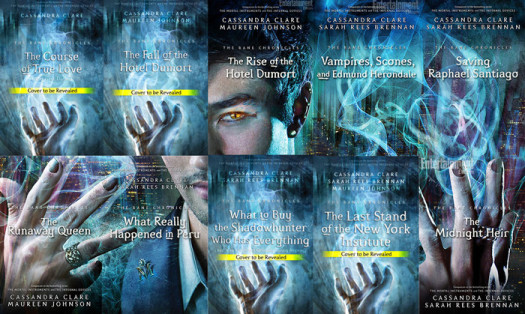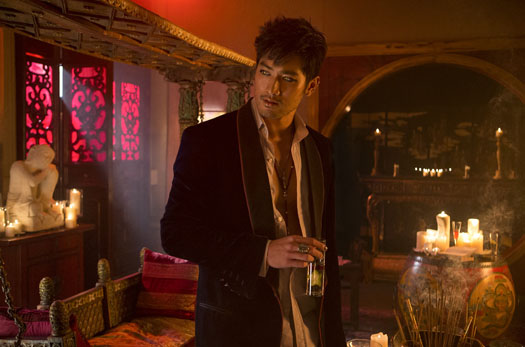Interview with Sarah Rees Brennan, co-author of The Bane Chronicles
Cassandra Clare’s bestselling Mortal Instruments series has spawned not only a prequel trilogy and a feature film, but a spinoff collection of ebook short stories, The Bane Chronicles, about one of the most popular characters in her series, bisexual Asian warlock Magnus Bane. Co-written with co-conspirators Sarah Rees Brennan (Untold) and Maureen Johnson (The Madness Underneath), the series of 10 connected tales launched in April 2013 from Margaret K. McElderry Books.

Released monthly, each story tackles a different chapter in Magnus Bane’s centuries-long existence. With ten installments planned, Clare is writing them alternately with Rees Brennan and Johnson, though the eighth story, “The Course of True Love (And First Dates),” which recounts Magnus’s first date with shadowhunter Alec Lightwood, will be written by Clare alone. The other stories take Magnus to Peru, Paris during the French Revolution, and London and New York at various times.
Earlier this summer, Sarah Rees Brennan took the time to answer a few of my questions about Magnus and his chronicles.
Malinda Lo: I understand that a lot of The Bane Chronicles was dreamed up while the three of you were goofing off (I mean WRITING) at a writing retreat in France. But normally, the three of you aren’t writing in the same room. How does your collaboration on these stories work? Does one person send a draft to another, and you trade for comments? Do you rewrite each other?

Sarah Rees Brennan: We do all those things — send comments, drafts, do whole rewrites! Each story is actually very different. And each story is written a different way, depending on who had the original idea, who had an improving idea, who was super familiar with that period of history. Like, Maureen is the one who lives in New York and has for a many a year, so she’s been amazing at historical New York in three of our stories now. Cassie wrote a romantic plotline (between a vampire and a werewolf) into “Vampires, Scones and Edmund Herondale” that had never occurred to me.
Some of them are written in person. Cassie and I wrote “The Midnight Heir” while we were on Cassie’s tour bus: one of us would write, and the other would gently nap on the writer’s shoulder and when she woke she’d see there was more story. We’d tell each other stories about the story while we were grabbing tea in Starbucks and as we did our make-up before events.
Maureen and I were sitting on the same sofa writing “The Last Stand of the New York Institute” together in England fairly recently — Cassie was sitting across from us. Maureen had just handed me a rejigger of a scene, and I was making faces in that way you do when you realise you’ve done something dumb, and here is the embettered version, and you’re mad your cowriter/your editor saw the mess you didn’t, and Maureen was like ‘WHY ARE YOU MAKING THAT FACE. YOU HATE ME, RIGHT?’ I was like ‘No, I love you. No, it’s just that normally you’re not here to see me make the face!’
Later we went down to the beach and I wrote ‘I LOVE YOU MAUREEN’ in the sand, but a dog walked across the message before she saw it, and then a seagull pooped in my hair.
… Possibly being separated sometimes isn’t so bad.
ML: Many YA romances seem to be about finding one true love that lasts forever — even if the main characters are teenagers. And yet Magnus Bane is several hundred years old and immortal, which means he has had the opportunity to fall in love several times. How do you think Magnus feels about the romantic ideal of one true, eternal love?
SRB: I think Magnus has learned very few things are eternal.
Love is so terrifying — the uncertainties of whether it is returned, how love can be created, why anyone loves anybody, the feeling we are unworthy of love. I understand where the ideal of one true love comes from. I think we come up with the idea of eternal love because losing love is so frightening, because we want to believe that once the miracle of love has happened it will stay.
But of course, life-long love, having only one romantic love, happens to so few of us, and we don’t live forever. Someone who does would have to be even more aware than the rest of us of how very easy love is to lose. And yet Magnus remains very hopeful: he maintains this great belief in love.
He thinks love is beautiful: he thinks humans are beautiful. All his actions —he’s an essentially kind person, he cares a lot about a lot of people, and he doesn’t stop caring, through the years —are predicated on that.

ML: The stories take place over several centuries and in different cultures, which is a pretty ambitious undertaking when it comes to writing short(er) stories! It’s been interesting to see how you’ve incorporated Magnus’s sexual fluidity (as I would call it) in these tales. Did you encounter any interesting challenges in portraying his identity in these different time periods and cultures?
SRB: I actually wasn’t prepared for the amount of research there was to do: I thought there would be quite a lot, but I told myself I was well up on history, and then it dawned on me there was a metric ton and I was in real trouble. My house is now layered in history books, obscure history books, books written hundreds of years ago because there are no contemporary accounts. I’m sure I didn’t get it all right. (Whereas Maureen and Cassie rocked the French Revolution, holy wow.) But I had to get it as close to right as I could, because it was so hugely important: this is history that does not get told. The vast majority of historical TV shows, movies and books are about white straight people. And I’m a white straight person, and that’s the history I’ve learned — the history that’s taught to so many people, giving us this awful, false idea of how history actually went down. There were balances to be struck — language about and concepts of sexual identity have changed. Times change, and people with them (e.g. one couple who as teenagers in 1870s England didn’t know how to recognise or discuss Magnus’s sexual fluidity, but they are aware of and comfortable enough with Magnus’s sexuality to chat about it with him by the time it’s 1903 in "The Midnight Heir"). I’m very sure I could have done better, but it was deeply important for us all to do the best we could.
Here’s a bisexual guy of colour, and his short stories (available only online, oh my god, brave new world we live in) are on the bestseller list, outselling many books on shelves. Jesse Williams will read you a bedtime story about Magnus! (He also mentioned that he liked Magnus and the story, and I had to go sit down.) It’s something that would have been unbelievable even a handful of years ago: I would have loved to see stories like this for teens, fantastical adventure stories about a character like this, in the mainstream, when I was a teenager. I’m so happy they exist now. Magnus is Cassie’s character, of course, and this overwhelming response to him is due to her and also due to the readers who have embraced him — who are displaying a demand for and a desire to see characters like him. I am just really honored to be a part of it, and also feel I owe it to the readers to do my absolute best not to let them down.
So now I own all these history books, some of them revolting stuff about the glories of conquest and colonisation, and also I have received an email from a lady scolding me about watching her family’s videos of their holiday in Peru, which she’d uploaded to share with her aunt. ‘They’re four years old,’ she said. ’WHY HAVE YOU WATCHED THEM SO OFTEN?’
ML: Most of The Bane Chronicles stories are set before The Mortal Instruments, but the last few do involve Alec, and the last one is suggestively titled “The Last Stand of the New York Institute.” (Or at least it is on Amazon!) When is that one set?
SRB: Well, there are TMI characters in it…
It is fun to have a couple of stories with Alec in them! Alec is Magnus’s main love interest (his only real love interest in the TMI books, though in the historical series he dallies with a vampire lady and a werewolf gent). Readers are very invested in them as a couple — it’s been something we’ve been conscious of throughout, the qualities that attract Magnus to someone. He has several other love interests in The Bane Chronicles, but we wanted to give a sense of Magnus coming full circle — to be the person readers came to know in 2007, to make sense as that person, with his past experiences illuminating him.
>>>
The first six stories of The Bane Chronicles are now available, with No. 7, “The Fall of the Hotel Dumort,” due out Oct. 15. Visit Shadowhunters.com for more info. Find out more about Sarah Rees Brennan at her website or follow her on Twitter.
<<<
Don’t forget to check out the Giant YA Pride 2013 Giveaway to win tons of wonderful LGBT YA novels.